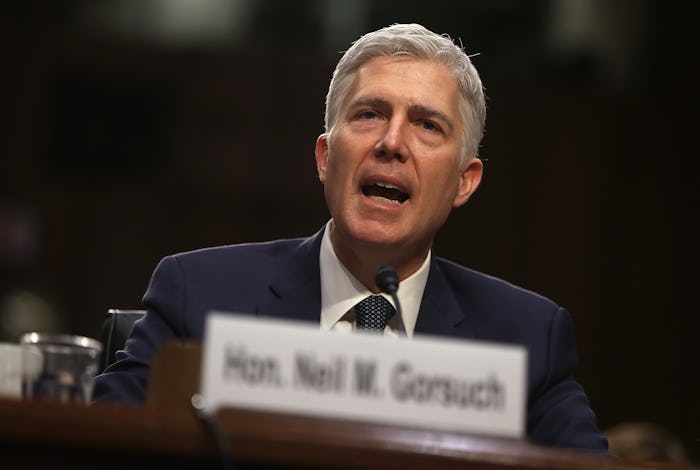News

How Long Can Democrats Filibuster Neil Gorsuch?
On Thursday, Democrats successfully filibustered President Trump's Supreme Court nominee, Neil Gorsuch. Unfortunately for Dems, that's not the final word on preventing the GOP from confirming Gorsuch to fill Justice Antonin Scalia's seat on the SCOTUS bench. How long can Democrats filibuster Neil Gorsuch? Like so many procedural minutiae of the Senate, there's no hard and fast answer, but it's unlikely Democrats will be able to push back the GOP "nuclear option" for much longer. In fact, the Democratic filibuster of Gorsuch may not even last the day, according to statements by Senate Majority Leader Mitch McConnell.
McConnell failed to secure enough votes for a cloture, gathering only 55 votes to enact cloture, and end the Democratic filibuster. McConnell needed a 60-vote majority. A second "motion to reconsider" — basically, a senatorial mulligan — produced the same results. Only 55 senators voted to end debate — 51 Republicans and and four Democrats. The Democrats only needed 41 votes to keep the filibuster going, and even picked up an extra 4 votes from their party to continue the filibuster against Gorsuch.
Now, Gorsuch's confirmation moves to a crucial vote: The nuclear option. McConnell has not yet put the vote to change Senate precedent to invoke the nuclear option and change the minimum number of votes needed to confirm a Supreme Court justice, but he is expected to bring that vote before the Senate on Thursday — and he only needs a simple majority to do it.
This puts Democrats in an impossible position: If McConnell goes nuclear, they only get an additional 30 hours of debate to filibuster Gorsuch. But once the Senate goes nuclear and the Dems use up their 30 hours of additional debate, that's it. That's all the options left to stop Gorsuch from being confirmed to the Supreme Court, as Senate procedure requires an up or down vote on the confirmation after those 30 additional hours.
However, given that even President Donald Trump urged McConnell to use the nuclear option in early February, it's unlikely McConnell will back down from going nuclear, despite being a Senate institutionalist (read: a senator who really geeks out over Senate procedure and history). As a motion to postpone Gorsuch's nomination is underway in the Senate, the next likely step is for McConnell to lower the voting threshold to confirm a Supreme Court nominee to a simple majority — for the first time in Senate history, and fundamentally changing SCOTUS confirmations for a generation or more.